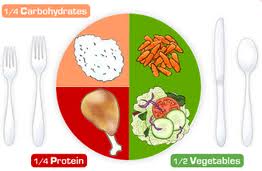1. Eat Food. Not too Much. Mostly Plants.
Michael Pollan wrote it. Live it.2. Eat Superfoods.
Superfoods pack the most nutrients into each serving.
3. Eat Real Foods.
Whether you concerned about salmonella in peanut butter and bisphenol A residue from foods packed in plastic, or just plain confused by misleading food labels, less-processed foods are the answer.
4. Eat Local.
Get your foods locally, so you can ask your farmer how she grows your food.
5. Eat In Season.
Get your nutrition from foods that are in season whenever possible for better nutrition – and taste!
Some great foods to add to your diet if you haven't already: Spinach, Walnuts, Salmon, Oats, blueberries.
Make sure you are eating a balanced plate:

If you're not sure about serving sizes, I love Tosca Reno's method. Measuring everything just isn't realistic. Use your hand to gauge a healthy serving size.

Based on an average-sized woman’s hand:
- Use your two open hands to guide you in selecting a healthy serving of vegetables.
- Use your fist to select a healthy portion of grain products. Your serving of rice or pasta should be equal to your fist.
- Use your palm to measure a healthy serving of meat and alternatives. Your chicken breast or lean steak should be the size of your palm.
- Include a fist-size serving of fruit with or between your meals.
- Use a thumb tip-size serving of fat.